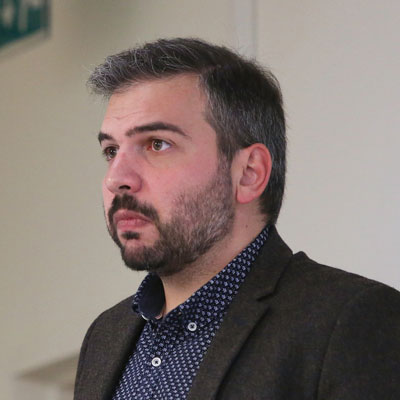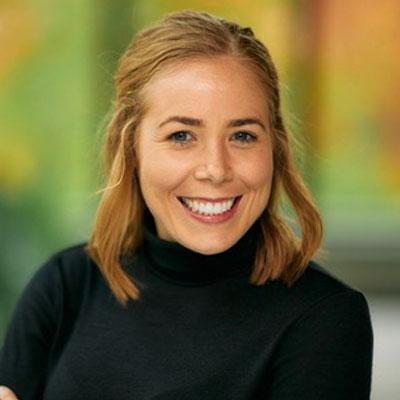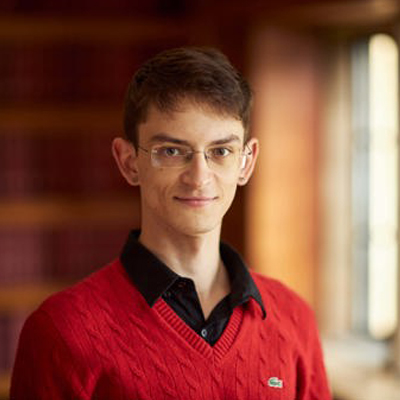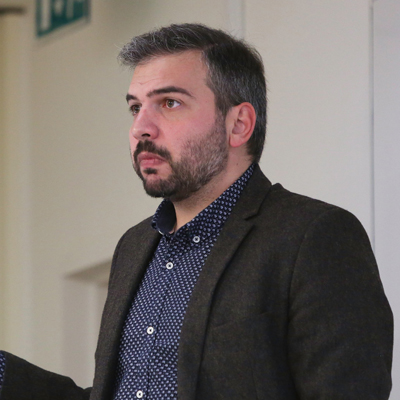Data Analysis for the Social Sciences
Data Analysis for the Social Sciences
Spyros Kosmidis (Oxford)
@KosmidisSpyros
 Spyros Kosmidis is an Associate Professor in DPIR and Director of the Oxford Spring School in Advanced Methods. Kosmidis's research focuses on social attitudes, voting, political economy and political communication.
Spyros Kosmidis is an Associate Professor in DPIR and Director of the Oxford Spring School in Advanced Methods. Kosmidis's research focuses on social attitudes, voting, political economy and political communication.
Qualitative Methods: (Interviews & Fieldwork)
Qualitative Methods: (Interviews & Fieldwork)
Marnie Howlett (Oxford)
@marnie_howlett
 Dr Howlett’s research lies at the nexus of geopolitics, cartography, borders, and nationalism within the former Soviet Union, particularly Ukraine. She has conducted extensive fieldwork in the country analysing the role of borders in shaping grassroots dynamics. Since the beginning of the Russia-Ukraine war, she has been working on several projects related to Ukrainian nation-building, including running two public opinion surveys in the country. Her main research interests also include the use of visual, spatial, and digital methods for qualitative political science research. She is a Departmental Lecturer in Russian and East European Politics at the University of Oxford. Marnie holds a PhD in International Relations from the London School of Economics and Political Science (LSE), a MA in Political Science, and a BA (High Honours) in International Studies from the University of Saskatchewan.
Dr Howlett’s research lies at the nexus of geopolitics, cartography, borders, and nationalism within the former Soviet Union, particularly Ukraine. She has conducted extensive fieldwork in the country analysing the role of borders in shaping grassroots dynamics. Since the beginning of the Russia-Ukraine war, she has been working on several projects related to Ukrainian nation-building, including running two public opinion surveys in the country. Her main research interests also include the use of visual, spatial, and digital methods for qualitative political science research. She is a Departmental Lecturer in Russian and East European Politics at the University of Oxford. Marnie holds a PhD in International Relations from the London School of Economics and Political Science (LSE), a MA in Political Science, and a BA (High Honours) in International Studies from the University of Saskatchewan.
Advanced Qualitative Methods
Advanced Qualitative Methods
Kalina Zhekova (UCL)
@Kalina_Zhekova
 Dr. Zhekova’s research examines the production and reformulation of state identities, conceptions of difference and threat, and the ideational role of nationalist-conservative domestic groups in shaping foreign policy orientations. Her work focuses specifically on Russian discourses and practices related to external interference, military intervention, state sovereignty, and armed conflicts in the post-Soviet space, the Middle East, and North Africa. Her main areas of expertise also include qualitative research methods and the application of discourse analytic and narrative approaches, process tracing and case comparison. She has extensive pedagogical experience and is particularly committed to advancing pedagogies of care within Political Science. Dr. Zhekova is an Associate Professor of Political Science at University College London (UCL), Departmental Head of Graduate Academic Support, and Co-Director of the UCL Centre for the Pedagogy of Politics. She is a winner of the UCL Provost Education Award and one of the recipients of the APSA-PSA International Partnerships Award, which recognises pedagogically impactful cross-national collaborations. She holds a PhD in Politics and International Studies from the University of Leeds and an MA in International Politics from the University of Hull.
Dr. Zhekova’s research examines the production and reformulation of state identities, conceptions of difference and threat, and the ideational role of nationalist-conservative domestic groups in shaping foreign policy orientations. Her work focuses specifically on Russian discourses and practices related to external interference, military intervention, state sovereignty, and armed conflicts in the post-Soviet space, the Middle East, and North Africa. Her main areas of expertise also include qualitative research methods and the application of discourse analytic and narrative approaches, process tracing and case comparison. She has extensive pedagogical experience and is particularly committed to advancing pedagogies of care within Political Science. Dr. Zhekova is an Associate Professor of Political Science at University College London (UCL), Departmental Head of Graduate Academic Support, and Co-Director of the UCL Centre for the Pedagogy of Politics. She is a winner of the UCL Provost Education Award and one of the recipients of the APSA-PSA International Partnerships Award, which recognises pedagogically impactful cross-national collaborations. She holds a PhD in Politics and International Studies from the University of Leeds and an MA in International Politics from the University of Hull.
Machine Learning
Machine Learning
Tom Robinson (LSE)
 Tom Robinson is an Assistant Professor in the Department of Methodology at the LSE. He is also affiliated with the Centre for Experimental Social Science (CESS) at Nuffield College, University of Oxford. His research interests surround representation, direct democracy and campaign finance, as well as issues within experimental methodology and computational social science.
Tom Robinson is an Assistant Professor in the Department of Methodology at the LSE. He is also affiliated with the Centre for Experimental Social Science (CESS) at Nuffield College, University of Oxford. His research interests surround representation, direct democracy and campaign finance, as well as issues within experimental methodology and computational social science.
Large Language Models
Large Language Models
Maksim Zubok (Oxford)
@antndlcxr
 Maksim Zubok is a DPhil student specialising in political methodology. His research explores how to use language models in political science, focusing on data annotation tasks and modelling of public opinion and human behavior. He is a convener of the LLMs for Social Sciences workshop – an initiative that aims to bring social scientists and AI researchers together to keep up with rapid advancements in NLP and integrate these insights into political science via collaborative research projects.
Maksim Zubok is a DPhil student specialising in political methodology. His research explores how to use language models in political science, focusing on data annotation tasks and modelling of public opinion and human behavior. He is a convener of the LLMs for Social Sciences workshop – an initiative that aims to bring social scientists and AI researchers together to keep up with rapid advancements in NLP and integrate these insights into political science via collaborative research projects.
Causal Inference 1: (Social Science Experiments)
Causal Inference 1: (Social Science Experiments)
Noah Bacine (Oxford)
@NBacine
 Noah Bacine is the Assistant CESS/Lab Director in June 2021. Noah specializes in experimental and behavioural economics with a focus on understanding how individuals respond to different forms of inequality/unfairness. His primary responsibilities are training aspiring experimentalists and facilitating their experiments, while his work involves experiments related to redistribution, conflict and the impact of unfairness on the rejection of democratic norms.
Noah Bacine is the Assistant CESS/Lab Director in June 2021. Noah specializes in experimental and behavioural economics with a focus on understanding how individuals respond to different forms of inequality/unfairness. His primary responsibilities are training aspiring experimentalists and facilitating their experiments, while his work involves experiments related to redistribution, conflict and the impact of unfairness on the rejection of democratic norms.
Causal Inference 2: (Design-Based Approaches)
Causal Inference 2: (Design-Based Approaches)
Nelson Ruiz (University of Essex)
@nelson_ruizg
 Nelson is a Senior Lecturer (Associate Professor) and Head of the Political Economy Research Division in the Government Department at the University of Essex. He is also a Senior Visiting Fellow at the LSE Government Department, an Associate Member at Nuffield College University of Oxford, an Associate Member at the Department of Politics and International Relations (DPIR), and a Research Associate at Oxford's Latin American Centre. His research interests are in the political economy of development. Within this field, the main topic he is interested in is the role of money in politics. He is also interested in studying corruption and political selection. His research involves the use of causal inference methods and some data science tools.
Nelson is a Senior Lecturer (Associate Professor) and Head of the Political Economy Research Division in the Government Department at the University of Essex. He is also a Senior Visiting Fellow at the LSE Government Department, an Associate Member at Nuffield College University of Oxford, an Associate Member at the Department of Politics and International Relations (DPIR), and a Research Associate at Oxford's Latin American Centre. His research interests are in the political economy of development. Within this field, the main topic he is interested in is the role of money in politics. He is also interested in studying corruption and political selection. His research involves the use of causal inference methods and some data science tools.
Text Analysis
Text Analysis
Michal Ovádek (UCL)
@michal_ovadek
 Michal Ovádek is a lecturer in European politics at the Department of Political Science, University College London. His research focuses on European integration, judicial politics and democratic backsliding in Central and Eastern Europe. He teaches primarily quantitative methods at UCL.
Michal Ovádek is a lecturer in European politics at the Department of Political Science, University College London. His research focuses on European integration, judicial politics and democratic backsliding in Central and Eastern Europe. He teaches primarily quantitative methods at UCL.




